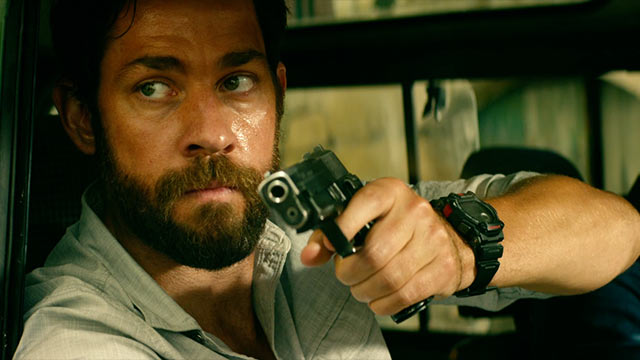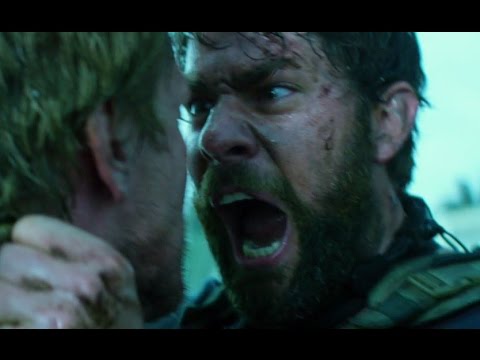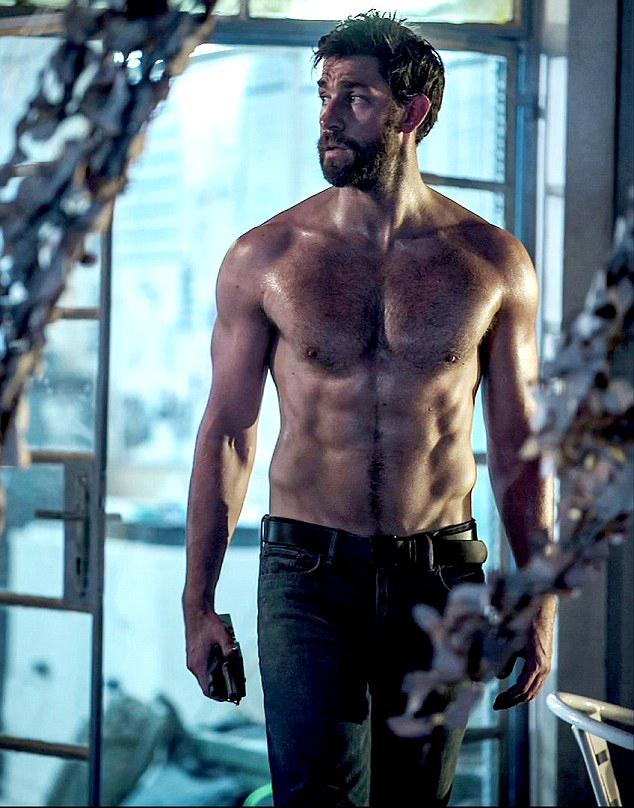For better or worse, Michael Bay’s name has been synonymous with bombastic blockbuster films for the past decade. The Transformers franchise (four films strong, with a fifth on the way) is still a box office juggernaut, and its shaky, frantic action cinematography and action setpieces have inspired a fair share of imitators and set a template for destructive third act carnage that franchise flicks still use. Bay’s idiosyncrasies have worn thin for most critics, but I felt there was a spark of brilliance in 2013’s Pain and Gain, the first non-Transformers film Bay had directed in nearly a decade. Would 13 Hours, based on the siege of the U.S. embassy in Benghazi in 2012, similarly allow him to stretch himself stylistically?
No, as it turns out. 13 Hours is a dour, violent affair, filled with unlikeable characters and long periods of repetition and boredom, punctuated with graphic gore. It’s a film that opens with news footage of Gaddafi’s corpse being dragged through the street, and it remains that level of unpleasant for nearly the entire run time.
13 Hours follows Jack Da Silva (John Krasinski), a former Navy SEAL, who ships out to Benghazi as a private security contractor for the CIA at the request of his friend, Tyrone “Rone” Woods (James Badge Dale). The team of contractors deals with suspicious locals and unfriendly CIA analysts, including the snooty, self-important Chief (David Constabile), but they manage to maintain a level of calm until the September 11th visit of U.S. Ambassador Christopher Stevens (Matt Letscher). After receiving a distress call, the soldiers attempt first to save Stevens from insurgents attacking the embassy, and then eventually fall back to protect the CIA annex where they’re stationed.
For a film about the oft-discussed Benghazi attacks, it’s surprisingly light on actual political message. Hillary Clinton’s name is unmentioned, as is Barack Obama’s, and none of the events are treated specifically as being the “fault” of the State Department or anything else. Instead, we get a heavy dose of Bay’s general politics, which should be familiar to viewers of most of his other films: bureaucracy/government is bad, but military/assault weapons are cool. To this end, the CIA operatives in the film are almost uniformly snooty, rude, and cowardly, and the security contractors—as good, red-blooded Americans—are openly dismissive and hostile towards them. The contractors are similarly dismissive of local security, the Ambassador’s security detail, and pretty much everyone outside their unit. It’s a gung-ho machismo that might appeal to some viewers, the idea that these Harvard-educated desk workers create problems that the real men have to solve, but it works against the overall cohesion of the story. It’s hard to care about the safety and survival of these people if the protagonists you’re supposed to identify with don’t seem to either, beyond their work obligation.
Casting-wise, the film is kind of a crap shoot. James Badge Dale is suitably badass as Tyrone, and David Constabile’s station chief is appropriately loathsome. But these characters are so thinly written in the script that they become mouthpieces, and that’s hard to really praise. Krasinski isn’t a bad actor, per se, but this sort of toughness is a little outside his wheelhouse, and any time he truly emotes, whether it’s a glare at a local security guard or the wrinkling of his forehead as he fights back tears, it triggers the Pavlovian laugh of years of The Office. His erstwhile rival from that series, David Denman, fares a little better as Boon, a dry, sardonic contractor who reads Joseph Campbell on his downtime. His response to a local translator suddenly being forced to gear up and head into the fray, “Well, that guy’s not coming back,” is coal black, but it’s probably the funniest part of the movie.
That brings me to another issue with 13 Hours, the fact that it’s almost completely devoid of the humor or over-the-top style that defines so much of Bay’s oeuvre. Transformers is often juvenile and lowest common denominator stuff, but at least it’s rife with comic relief characters and gags. 13 Hours restricts its humor to locker room banter within the squad in the first third of the film, and while there are a couple slick moments of gunplay and car chases early on, it quickly turns into an attempt to imitate Black Hawk Down or Saving Private Ryan, without the charisma and gravitas that made those films work. There’s not really room in the 2012 Benghazi attacks for a stereotypical Mexican street vendor or someone jumping through the glass window of a skyscraper, but without those Bay hallmarks, it’s just a lot of yelling and grenade explosions in the dark.
The best part of the film, and the one element I would say is worthwhile, is how well it depicts the fog of war in a modern setting. The second act of the film, when the security contractors are attempting to control the situation at the embassy, is full of paranoia and reversals. It’s not always easy, for the characters or the audience, to know what’s happening, and a pickup truck full of men with guns is equally likely to be local hired security or violent insurgents. Here, Bay has actually turned his penchant for overly busy action into a strength, by using it to convey the uncertainty of war against a non-state, seemingly disorganized enemy. It’s a tactic that works alright here, and will hopefully continue to be applied elsewhere by more talented filmmakers.
Although 13 Hours is devoid of heavy-handed politics or blame, it still manages to be pretty offensive in its treatment of Libyans. The movie repeatedly cuts to shots of young children playing in the streets and other “local color” elements, but there’s no real purpose to it, except maybe to provide a balance to the hordes of young men who are perforated with bullets while attempting to attack the compound. An ending newsreel montage includes footage of a Libyan holding a sign denouncing the attacks, but it doesn’t do much to counter statements like “everyone’s an enemy until they prove otherwise” and “you gotta do something about your country, bro,” to a local translator who spent the night helping the contractors protect the compound. It’s possible, given scenes like one at the end where local women mourn their husbands and sons who died attacking the compound, that we ourselves are supposed to apply a level of judgment to the characters, rather than taking them at their word, but given the way audience members at my screening laughed and cheered as an insurgent was split in half by heavy machine gun fire, I doubt it.
I don’t know what I expected from 13 Hours. I knew it wouldn’t be a real life G.I. JOE, but I’d hoped some level of the style and vision Bay has proved himself capable of would shine through. Instead, it’s the anti-Pain and Gain, an overlong, gory drag, one that says nothing and showcases no one.
13 Hours is now in theaters.



